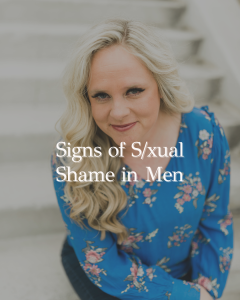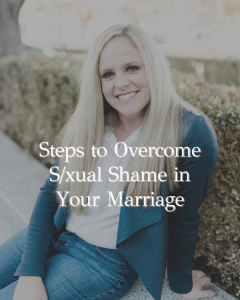
What comes to mind when you think about the word purity? I am a big believer that words matter so in this episode, let’s talk about what purity actually means and what that definition, which is different than what you think it is, is doing to your relationship with yourself and your sex life. It’s time to break free of the purity culture that many of us were raised in and see ourselves and our sexuality as it really is!
Show Notes:
Follow Amanda on Facebook and Instagram.
Join Amanda’s Private Facebook Group.
References for this episode:
Unlearning Shame, Relearning Pleasure: Resources on Healing From Purity Culture
Purity culture: How sex was taught to a generation of Southerners
Show Summary:
If you aren’t on my email list or follow me on Instagram, you may not have heard that I have opened my Embrace You Elite Society to everyone. It used to only be open to those who went through my 1:1 or group coaching. But I have now made it available to anyone who wants to join. This will make it much more available to those who want help with improving their relationship with themselves, their spouses, and their sexuality for a much lower cost than 1:1 or group coaching.
My Embrace You! Video Course is included (a $499 value) and then there are weekly coaching calls, monthly classes, and so much more. To learn more about it go to AmandaLouder.com and Click on the Work With Me tab in the menu and then coaching. Right now I am offering a special to my podcast listeners. You can use the code: podcastlistener at checkout to get $150 off the initial fee and this is good through the end of February. It is normally $499 to join and then $49/month. But with the coupon, you can join for just $349 and then $49/month for as long as you want to stay in the membership. You can cancel anytime.
Let’s get into today’s topic:
When you think of the word purity, what comes to mind?
- Sexual Purity
- Chastity
- Virtue
- Naive
Let’s actually look at the definition, shall we?
According to Google, Purity means
- freedom from adulteration or contamination
- freedom from immorality, especially of a sexual nature
Ok, that seems to fit. But let’s look back in history. From the 1828 Websters Dictionary purity is defined as:
- Freedom from foreign admixture or heterogeneous matter; as the purity of water, of wine, of spirit; the purity of drugs; the purity of metals.
- Cleanness; freedom from foulness or dirt; as the purity of a garment.
- Freedom from guilt or the defilement of sin; innocence; as purity of heart or life.
- Chastity; freedom from contamination by illicit sexual connection.
- Freedom from any sinister or improper views; as the purity of motives or designs.
- Freedom from foreign idioms, from barbarous or improper words or phrases; as purity of style or language.
I’m a big believer that words matter. Having the right vocabulary is important. In Episode 37 – Emotional Vocabulary, I talk about how it’s important to have an emotional vocabulary so that we can correctly identify what we are truly feeling.
I was recently reading Brene’ Brown’s newest book Atlas of the Heart (fabulous book, by the way. I highly recommend it). And she said “Language is our portal to meaning-making, connection, healing, learning, and self-awareness. Having access to the right words can open up entire universes.”
So what does this have to do with purity? We often mistake purity as being sexless, naive, or pleasureless. But according to both Google and the 1828 Websters Dictionary, purity is about freedom. Purity opens us up to freedom and joy. Definition 3 from the 1828 dictionary reminds us that it’s not about sexual purity in every area. It’s about freedom from contamination by illicit sexual connection. What is illicit? According to the same dictionary it is: “not permitted or allowed, prohibited, or unlawful.” The Law of Chastity says that sexual relations must only happen between couples who are legally and lawfully wed. That’s not illicit. That is not impure.
Let’s also define freedom – I liked definition 6 from the 1828 dictionary for freedom. It says: Ease or facility of doing anything. That sure sounds like a recipe for great sex…ease.
Isn’t it interesting that we don’t talk about purity with other “sins” besides sexual sins. We don’t talk about it with keeping the Sabbath Day holy. We don’t talk about it with Tithing. We don’t talk about it with anything else. So why do we talk about it with sex? And how can we unlearn and heal from it.
Since words are important, I think we need to define purity culture, because that is really where this came from.
According to ReckonSouth.com, “The purity movement was born out of 1990s protestant Christianity, a response to the AIDS epidemic and a rejection of the ‘60s and ‘70s free love movement. Purity culture promoted abstaining from sex until marriage and, in some cases, discouraged dating. In 1993, the Southern Baptist Convention launched its ‘True Love Waits’ campaign, which used youth conferences, books and purity pledges to discourage teens from having sex.”
In many church’s, there were ceremonies where girls made promises to their fathers, rings included, to remain pure until marriage. This purity culture, while maybe not taken to the extreme lengths in the Church of Jesus Christ of Latter-day Saints, definitely exists. And is and was harmful to so many.
According to Kersti Spjut, a licensed clinical psychologist from Brigham Young University, “purity language triggers our disgust, and disgust is meant to keep us safe from contamination or disease. Using purity language sets us up to never forgive ourselves for our mistakes.”
Again, in Atlas of the Heart, Brene Brown says “With disgust…we want to avoid being “poisoned” (either literally or figuratively.) Researchers believe that “the experience of disgust encourages individuals to distance themselves from the emotion eliciting source, thereby limiting contact and exposure to the potentially infectious or toxic target.”
So if purity language triggers our disgust, and the emotion of disgust encourages us to distance ourselves from the source, it’s no wonder we reject ourselves and sex.
Brene’ Brown quotes Johnathan Haidt in her book as saying “How does an emotion that is hardwired to protect us from actual toxins and poisons become something we feel toward other people? Researchers explain that core disgust is thought to protect the body from ingestion of contaminants, while disgust in an interpersonal context is thought to “protect” us from unseemly behavior or contamination of the soul.”
Contamination of the soul…what a perfect description of what purity culture is trying to protect us against. But yet, what it actually does, is protect us from feeling the freedom, ease and joy that comes from a wonderful sexual relationship.
How do you know if you have been affected by purity culture? Here are some signs:
- You feel like your body is sinful or is the “source of sin.” This might look like a deep, sometimes unconscious feeling that there is something wrong, broken, or unloveable about us.
- Your body is shameful and makes you want things you shouldn’t want (sex outside of marriage, or even within marriage just for the sake of fun and pleasure).
- Your body should look and behave a certain way.
- Other people (the church, general authorities, your family, patriarchal figures, etc.) determine how you should be in the world. That is, you look to others instead of developing and trusting your own authenticity and subjectivity.
(Unlearning Shame, Relearning Pleasure: Resources on Healing From Purity Culture)
So how do we heal from this purity culture? When we are married and sex is allowed, how do we heal ourselves from feeling the disgust that sex and our bodies can often make us feel?
- Reflect on the ways in which you’ve internalized messages about sex, love, what is “good” and what is “bad” or shameful in your own life. I recommend journaling about this. This is an exercise that I take all of my clients through, with specific questions to help them understand their belief systems.
- Make a list of your “shoulds” – the rules you follow automatically and without question. Ask yourself whose voice you hear them in. Is it your mother’s voice? Your father’s? A teacher or someone from church? Is it your own voice from a certain age? What does your child self, your adolescent self, tell you about how you should be in the world? What are the feelings behind these rules?
“Often when we can get quiet with ourselves and try to practice compassion and non-judgment, even with the parts of ourselves we most want to change, we often find that the motivating factor behind them is fear. What does following the rules of purity culture protect you from?”
Charis at Evergreen Counseling writes that healing from purity culture means “befriending our bodies and coming back to ourselves.” In order to do this, we have to learn to trust the wisdom of our bodies.
Reconnecting with your freedom, autonomy and agency means understanding your desires, and celebrating them. This is another thing I do with my clients. We need to learn to differentiate the “shoulds” from our authentic desires.
“Healing from purity culture is ultimately the way we unlearn systems of oppression on an embodied, rather than intellectual, level. It allows us to find a home in our bodies again. It is homecoming; or rather, a series of homecomings that we participate in over the course of our lives and our learning. It’s okay if you need to learn a lesson more than once, so long as you keep going.”
In the past, most of my coaching has been focused on mindset work. But in the Embrace You! Elite Society, we will also be doing a lot of embodiment exercises. I am going to put practices into the Society to help women get back in touch with their body, pleasure, and desires as a way to heal themselves and come back to who they were created to be. So go to AmandaLouder.com to join.



